Wibsey’s Skills For Life Curriculum
‘Every state-funded school must offer a broad and balanced curriculum that promotes spiritual, moral, cultural, mental and physical development of pupils at the school and of society’
– The National Curriculum 2014
At Wibsey Primary School we strongly believe that children cannot reach their full potential unless they understand themselves, relationships and the communities that they encounter. We want our students to not only excel academically but to become thoughtful and responsible citizens of the world, who make a positive impact on the people around them.
“Be the change that you wish to see in the world.”
– Mahatma Gandhi
Over the last three years, we have undergone an exciting journey which has enable us to delve deeper into emerging social issues such as gender stereotyping and discrimination all the way through to keeping safe in a digital era. We have embraced projects like the ‘Diversity Defenders’, which encourage positive activism though fighting prejudice, and have received visits from charities like Diversity Role Models who educate our children about LGBT rights. This has been enhanced by our community links with the police, Salvation Army, The Healthy Life Style Caravan and the Positive Life style centre at Bradford city stadium.

Children at the anti-bullying picket
Through meeting aspiration role models and having the opportunity to deepen their understanding through PSHE lessons and learning outside the classrooms, the children have a greater understanding of what it means to be a ‘British Citizen‘ who respects, cares for and works with everybody. This is evidenced in our pupil’s enthusiasm during their anti-bullying pickets, and in their willingness to put themselves forward for new opportunity like ‘Wibsey’s Got Talent, Choir and Wibsey Masterchef. It is also seen in their positive activism in the community through the concerts they put on, the charities they support and the awareness campaigns they get involved with.
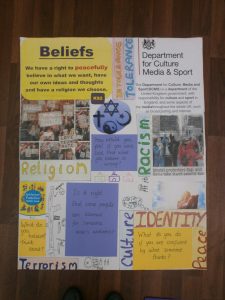
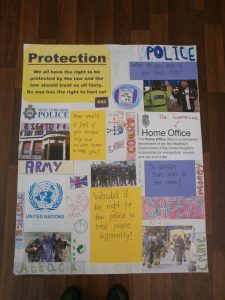
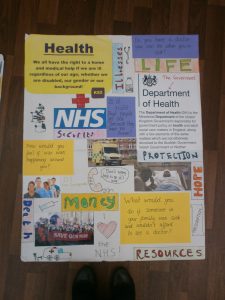
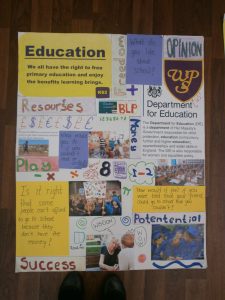
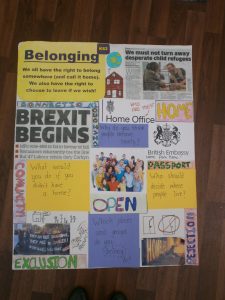
Investigating ‘Individual liberties’ during Diversity Week
We cannot always build the future for our youth, but we can build our youth for the future.”
– Franklin D. Roosevelt
This year will see the implementation of our new ’Skills for Life’ curriculum which is a progressive, holistic approach to the teaching and learning of Personal, Social, Health and Economic (PSHE) and citizenship education. It puts children’s wellbeing and Spiritual, Moral, Social and Cultural (SMSC) development at the heart of all school’s priorities and initiatives including the academic curriculum.
Empowering the children of today for the challenges of tomorrow.
– Wibsey Skills for Life
Through the Wibsey Skills for life curriculum the children will foster key knowledge and skills needed to deal with ‘modern day society’ and the unforeseen challenges of tomorrow. The aim is to future proof our children by encouraging them to understand and ‘own’ eleven key life skills:
| Life Skill | Description | Key Themes |
|---|---|---|
| Developing a Healthy Lifestyle | Understanding how to care for their physical, emotional and mental wellbeing and the relationship between these. | Life choices, Diet; Self-esteem and seeking support; Mental Health; Promoting Good Hygiene; Drugs; The body & puberty; Reproduction; Sexual Exploitation; FGM |
| Managing Relationship | Identifying different types of relationships and how to create positive ones. | Identifying healthy relationships; Communicating in different relationships; Types of Relationships; How to begin and end relationships; Marriage; Anti –Social Behaviour |
| Effective Decision Making | How to assess risk and consider appropriate choices in making decisions. | Understanding personal accountability; Evaluating life choices; Assessing risk; Managing inappropriate request; Judging appropriate contact; Managing dares. |
| Communicating Clearly | Understand different communication styles, negotiating and conflict resolution in different contexts | Managing your inner voice; Recognising emotions; Conflict resolution; Debating; Listening and effective feedback |
| Understanding Rights and Responsibilities | Thinking about personal accountability, law and their human rights. | Understanding independence; Different rights and responsibilities; Understanding rules and expectations; Understanding the law; Human rights |
| Coping with Life | Understanding how to deal positively with modern day challenges of technology and life. | Managing Loss, Resisting Pressure; Actions in an emergency; Physical safety; E safety; Managing Technology; Recognising prejudice and discrimination |
| The Art of Thinking | Investigating themes around boundaries, habits, gender and viewpoint. | Defining danger; The nature of habits; Confidentiality; Understanding stereotypes; defining Gender and Sex; boundaries; Respecting points of view; Understanding cultural influences. |
| Managing Finances | Understanding the value of money, resources and how to develop entrepreneurial skills | Understanding the role of money; Managing money; Early economics (the value of resources); Becoming enterprising |
| Goal Setting | Reframing failure and thinking about the future. | Building on success; Shared goals; Reframing failure |
| Engaging in the Community | Understand diversity, prejudice and activism as a British and Global citizen. | Understanding diversity; Recognising bulling and abuse; Community; Positive activism; Valuing diversity; Extremism & Radicalisation (Prevent ); Banded cultural practices |
| Managing Media | How to critically engage with media and understand how the media can distort reality (body image, stereotyping). | Managing media images; Dealing with media pressures; Questioning media content; Editing media content |
The ‘Wibsey Skills for Life’ curriculum is not a scheme of work. It is a holistic approach to SMSC, wellbeing & safeguarding that will be implicitly interwoven within the school’s current curriculum provision. It will incrementally build upon objectives that enable children to understand and question complex concepts such as ‘diversity’, ‘consent’ and ‘responsibility’, thus promoting the interpersonal, resilience and self-regulation skills that our children need to succeed in life.
Taking a fully integrated, cross curricular approach to children’s SMSC and wellbeing will result in happier, healthier children that are more engaged in school, consequently raising attainment.
– Bonnell et al 2014
We are looking forward to the exciting challenges that lie ahead and look forward to sharing our exciting work with you.
